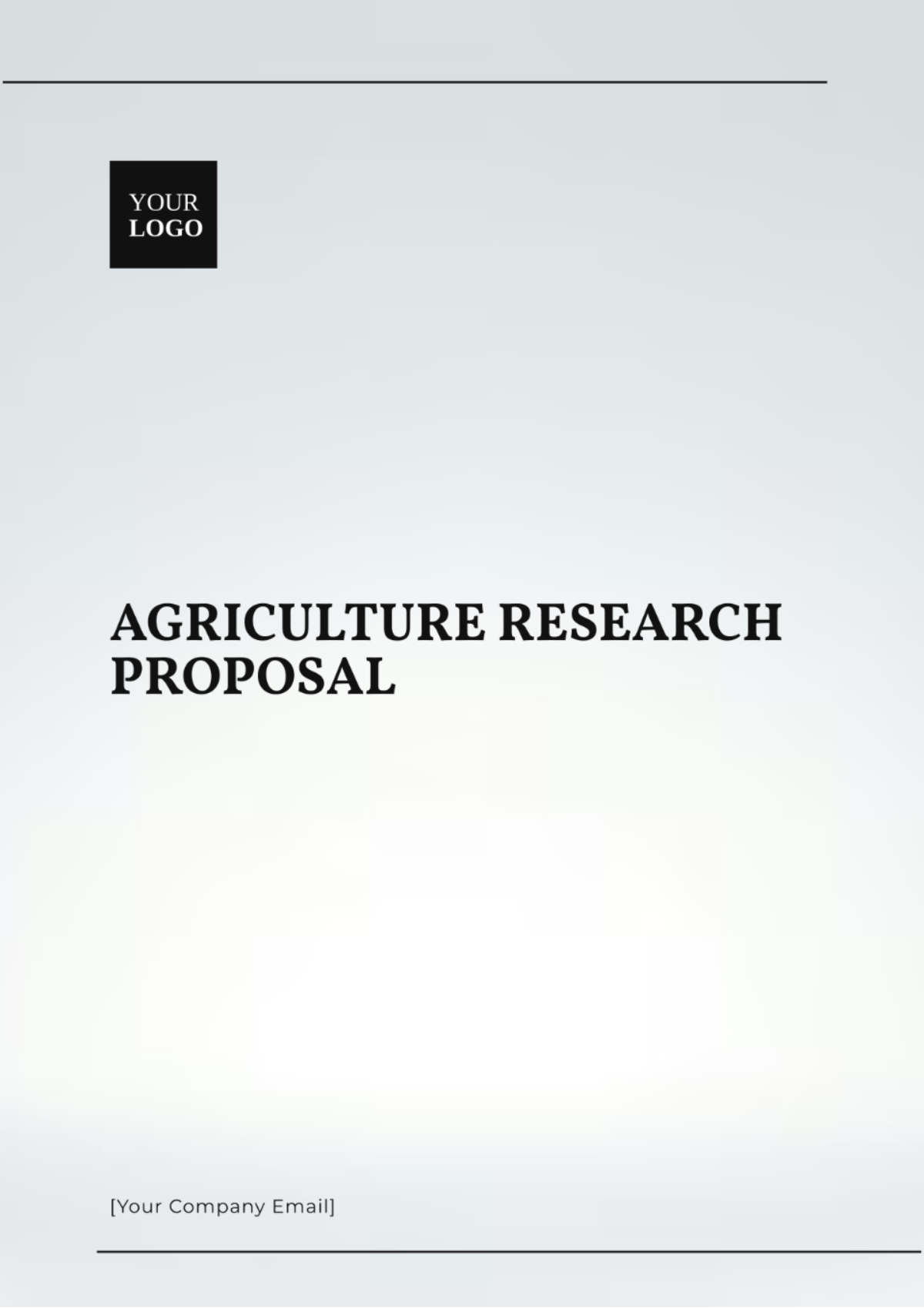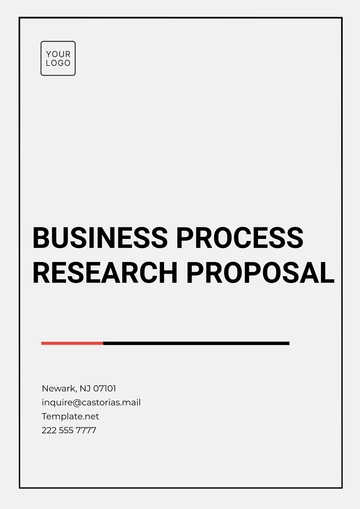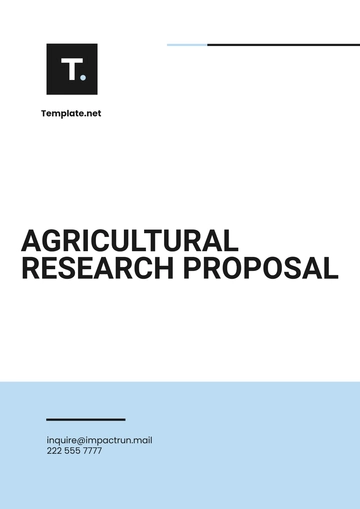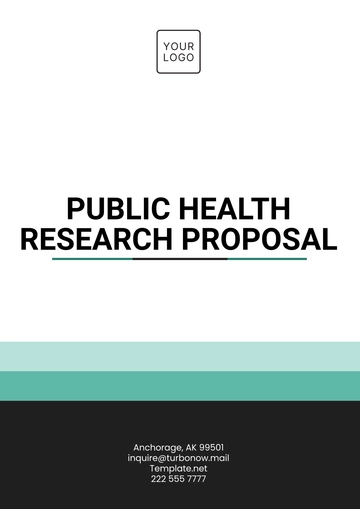Free Agricultural Research Proposal

Prepared By: [YOUR NAME]
Date: [DATE]
I. Abstract
This research proposal aims to investigate sustainable farming techniques to improve crop yield and soil health. By integrating advanced irrigation systems, organic fertilizers, and crop rotation methods, the research will assess their efficacy in diverse climatic conditions. Anticipated outcomes include increased productivity and enhanced soil fertility, which will be beneficial for the agricultural sector.
II. Introduction
Agriculture, a crucial industry, confronts challenges like soil degradation, water scarcity, and climate change, making sustainable farming practices essential for food security. This research examines innovative techniques to enhance productivity while preserving the environment, driven by the urgent need for efficient farming methods to support increasing populations and reduce environmental harm.
III. Objectives
Evaluate Advanced Irrigation Systems: Assess how modern irrigation technologies affect crop yields, water use efficiency, and agricultural performance in various climates.
Compare Organic vs. Conventional Fertilizers: Analyze the impact of organic fertilizers versus chemical ones on crop growth, soil health, and sustainability.
Examine Crop Rotation Benefits: Investigate how different crop rotation methods improve soil fertility, nutrient balance, and pest resistance.
Develop a Sustainable Farming Framework: Create a model integrating advanced irrigation, organic fertilization, and crop rotation to enhance sustainability and agricultural productivity.
IV. Literature Review
Extensive research has been conducted on various sustainable agricultural methods. Studies show that advanced irrigation systems can significantly reduce water usage and enhance crop productivity (Smith et al., 2050). Organic fertilizers have been found to improve soil structure and nutrient content compared to chemical fertilizers (Johnson & Green, 2059). Crop rotation has been historically employed to maintain soil health and prevent pest infestations (Wilson, 2058). Despite the wealth of knowledge, integrated approaches combining these techniques require further exploration.
V. Methodology
The research will employ a mixed-methods approach, combining quantitative field experiments and qualitative surveys. The study will be conducted in various geographic locations to account for different climatic conditions. Key steps include:
Site and Crop Selection: Identify and choose diverse test sites and crop varieties that represent different climatic and soil conditions.
Implementation of Irrigation and Fertilization: Install advanced irrigation systems and apply organic fertilizers across selected sites to assess their effectiveness.
Design and Execute Crop Rotation Plans: Develop and implement crop rotation schedules tailored to each site to optimize soil health and productivity.
Monitor and Collect Data: Systematically track and record data on crop yields, soil quality, and water usage throughout the study period.
Conduct Statistical Analysis: Perform statistical analyses to evaluate and compare the results across different test sites and treatment methods.
Gather Qualitative Insights: Interview farmers to obtain feedback on the practical application and challenges of the techniques employed.
VI. Budget
Item | Cost (USD) |
|---|---|
Equipment (Irrigation systems, sensors) | $25,000 |
Organic fertilizers and seeds | $10,000 |
Laboratory analysis | $15,000 |
Fieldwork travel and accommodations | $7,000 |
Data analysis software | $5,000 |
Miscellaneous expenses | $3,000 |
Total Estimated Cost: $65,000
VII. Timeline
The research project is anticipated to last two years, with the following key milestones:
Timeframe | Milestones |
|---|---|
Months 1-3 |
|
Months 4-6 |
|
Months 7-12 |
|
Months 13-18 |
|
Months 19-21 |
|
Months 22-24 |
|
VIII. References
Johnson, R., & Green, A. (2059). Comparative effectiveness of organic and chemical fertilizers. Agricultural Science Journal, 45(2), 235-250.
Smith, L., et al. (2050). The impact of advanced irrigation systems on crop yields. International Journal of Sustainable Agriculture, 52(3), 180-195.
Wilson, J. (2058). Benefits of crop rotation practices. Journal of Agronomy, 36(8), 715-728.
- 100% Customizable, free editor
- Access 1 Million+ Templates, photo’s & graphics
- Download or share as a template
- Click and replace photos, graphics, text, backgrounds
- Resize, crop, AI write & more
- Access advanced editor
Support agricultural innovation with our Agricultural Research Proposal Template from Template.net. This editable and customizable template is designed to help you outline your research goals, methodologies, and expected outcomes in the agricultural sector. Editable in our AI Editor Tool, it allows you to customize the template to suit your specific research focus.
You may also like
- Business Proposal
- Research Proposal
- Proposal Request
- Project Proposal
- Grant Proposal
- Photography Proposal
- Job Proposal
- Budget Proposal
- Marketing Proposal
- Branding Proposal
- Advertising Proposal
- Sales Proposal
- Startup Proposal
- Event Proposal
- Creative Proposal
- Restaurant Proposal
- Blank Proposal
- One Page Proposal
- Proposal Report
- IT Proposal
- Non Profit Proposal
- Training Proposal
- Construction Proposal
- School Proposal
- Cleaning Proposal
- Contract Proposal
- HR Proposal
- Travel Agency Proposal
- Small Business Proposal
- Investment Proposal
- Bid Proposal
- Retail Business Proposal
- Sponsorship Proposal
- Academic Proposal
- Partnership Proposal
- Work Proposal
- Agency Proposal
- University Proposal
- Accounting Proposal
- Real Estate Proposal
- Hotel Proposal
- Product Proposal
- Advertising Agency Proposal
- Development Proposal
- Loan Proposal
- Website Proposal
- Nursing Home Proposal
- Financial Proposal
- Salon Proposal
- Freelancer Proposal
- Funding Proposal
- Work from Home Proposal
- Company Proposal
- Consulting Proposal
- Educational Proposal
- Construction Bid Proposal
- Interior Design Proposal
- New Product Proposal
- Sports Proposal
- Corporate Proposal
- Food Proposal
- Property Proposal
- Maintenance Proposal
- Purchase Proposal
- Rental Proposal
- Recruitment Proposal
- Social Media Proposal
- Travel Proposal
- Trip Proposal
- Software Proposal
- Conference Proposal
- Graphic Design Proposal
- Law Firm Proposal
- Medical Proposal
- Music Proposal
- Pricing Proposal
- SEO Proposal
- Strategy Proposal
- Technical Proposal
- Coaching Proposal
- Ecommerce Proposal
- Fundraising Proposal
- Landscaping Proposal
- Charity Proposal
- Contractor Proposal
- Exhibition Proposal
- Art Proposal
- Mobile Proposal
- Equipment Proposal
- Student Proposal
- Engineering Proposal
- Business Proposal





























